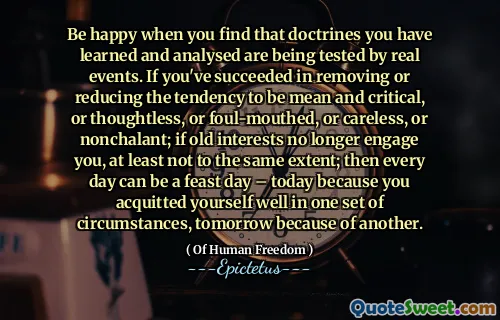📖 Epictetus
🌍 Greek
| 👨💼 Philosopher
Epictetus was a prominent Stoic philosopher whose teachings emphasized the importance of personal responsibility and the power of individuals to control their thoughts and reactions. Born a slave in Phrygia, he later gained his freedom and established a school of philosophy in Nicopolis, where he taught that true happiness comes from aligning one’s life with virtue and reason. His ideas focus on distinguishing between what is within our control and what is not, frequently advising individuals to focus on their own actions and attitudes in the face of external circumstances. Epictetus’s central tenet is encapsulated in the idea that while we cannot control external events, we can control how we respond to them. He believed that our perceptions and judgments shape our experiences, asserting that suffering often arises from false beliefs about what we can or should control. By practicing self-discipline and mindfulness, individuals can cultivate inner peace and resilience against life’s challenges. His teachings, recorded by his student Arrian in the "Discourses" and the "Enchiridion," advocate for a life of virtue as the pathway to tranquility. Epictetus’s emphasis on ethical living and the development of personal character has left a lasting impact on both philosophy and psychology, inspiring later thinkers and movements. His wisdom remains relevant, encouraging individuals to focus on their own moral integrity rather than external validations or outcomes.
Epictetus was a significant Stoic philosopher whose life experiences profoundly shaped his teachings. Originally a slave, he eventually became a respected teacher after gaining his freedom. His philosophy revolved around the concepts of personal responsibility and inner peace, emphasizing the importance of self-control and ethical behavior.
As a Stoic, Epictetus taught that true happiness comes from within and is achieved by focusing on what we can control—our thoughts and actions—while accepting what we cannot. This practical wisdom has influenced countless individuals throughout history.
The writings of Epictetus, particularly the "Discourses" and the "Enchiridion," remain foundational texts in Stoic philosophy, offering guidance on living a virtuous life. His insights continue to resonate, advocating for mental resilience in the face of life's challenges.
Loading...
More »
Today Birthdays
1964 -
Michelle Obama
1899 -
Nevil Shute
1957 -
Steve Harvey
1927 -
Eartha Kitt
1706 -
Benjamin Franklin
1914 -
William Stafford
1922 -
Betty White
1942 -
Muhammad Ali
1899 -
Al Capone
1962 -
Jim Carrey
1962 -
Sebastian Junger
1977 -
Leigh Whannell
1863 -
David Lloyd George
1955 -
Steve Earle
1899 -
Robert M. Hutchins
1928 -
Vidal Sassoon
1971 -
Kid Rock
1948 -
Mick Taylor
1980 -
Diogo Morgado
1982 -
Dwyane Wade
1863 -
Constantin Stanislavski
1969 -
Tiesto
1984 -
Calvin Harris
1947 -
Jane Elliot
1916 -
Edmund Morgan
1800 -
Caleb Cushing
1931 -
James Earl Jones
1969 -
Naveen Andrews
1949 -
Anita Borg
1940 -
Tabare Vazquez

















